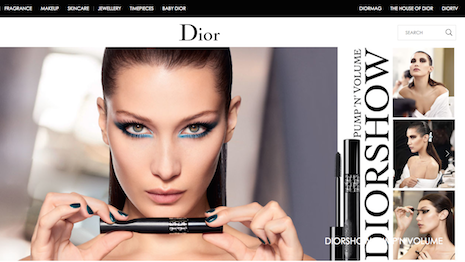- About
- Subscribe Now
- New York,
February 9, 2018

 Shopping through online and mobile is becoming more popular. Image credit: Dior
Shopping through online and mobile is becoming more popular. Image credit: Dior
Bricks-and-mortar may still be the top sales vessel for luxury brands, but affluent consumers are spending more money online now than ever before.
According to the Luxury Institute, about 38 percent of affluent shoppers’ spending on luxury goods happens via online and mobile channels. However, bricks-and-mortar remains a vital aspect of luxury retail, with 52 percent of high-net-worth individuals preferring to shop in stores.
"One of the biggest trends now underway is that the in-store experience is finally getting the focus it deserves in terms of upgrading technology, developing people, and redesigning inventory management and merchandising to elevate the customer experience," said Milton Pedraza, CEO of Luxury Institute.
Offline and online
Luxury Institute’s report looked at individuals from households who earn $150,000 per year or more in the United States and luxury consumers from the top 1 percent in outside countries such as the United Kingdom, France, Germany, Italy, China, Japan and Mexico.
Roughly 27 percent of luxury consumers have no preference in where they would rather shop when given the choice between digital or offline channels.
In-store shopping is still important. Image credit: Bloomingdale's.
However, 21 percent claimed they would rather purchase luxury goods online, a percentage that is slowly creeping upwards. Compared to last year’s report, preference for online shopping grew 2 percent, while bricks-and-mortar shrunk by 2 percent.
This growth suggests there will be a strong future in luxury for online retail, but the in-store shopping experience will always be necessity. Sixty percent of luxury spending from affluents happens through bricks-and-mortar, with boutiques leading the way.
About 36 percent of sales happen in brand boutiques, according to claims from respondents, whereas only 24 percent happen in department stores.
The biggest driver in terms of motivation for online shopping is inventory. Shoppers go online to buy products to be sure they are available, but expect free shipping and returns.
Looking forward, all retailers including luxury must leverage features such as in-store pickup and exclusive offers. Sales professionals need to be given the tools to arm themselves with as much information as possible.
Even consumers feel as though sales associates should be given tablets to help with product management and checkout, with more than half feeling so.
When leveraging technology, retailers and brands need to make consumers’ lives feel easier. For instance, shoppers favor digital receipts as they provide less paper waste and allow them to easily keep track of their receipts.
An example of emailed receipts. Image credit: Stripe.
Sixty percent of respondents prefer emailed receipts.
Just less than half at 49 percent would enjoy if retailers installed smart technology into fitting rooms such as interactive mirrors.
Free WiFi has been a staple in almost every retail store today and 51 percent of affluent consumers believe there should free WiFi in stores.
Additional insight
While luxury goods are likely to see a bit of a slump in 2018, high-end services will witness solid growth at the behest of millennials who value experiences over things.
This trend is one of the 10 collected in the Luxury Institute’s "Top 10 Luxury Trends for 2018," an annual list of the biggest trends, challenges and predictions for the upcoming year. In addition to the primacy of experiences over goods, luxury brands are focusing more on the emotional benefits their products can have for customers over the material benefits (see more).
The upcoming year’s total luxury sales will see most coming from travel-related purchases, according to Luxury Institute’s other study on the state of the luxury business, which surveyed thousands of affluent customers from the wealthiest nations in the world. The data supports the growing understanding that luxury consumers are beginning to value experiences over products (see more).
"Companies are increasingly adopting seamless integration between online and in-store channels, which is wonderful because it benefits consumers and provides new opportunities for front-line store teams," Luxury Institute's Mr. Pedreza said.
Share your thoughts. Click here